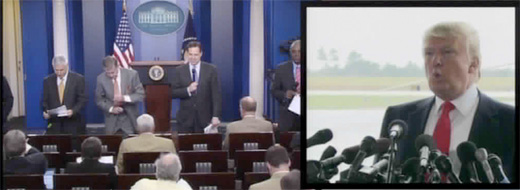Gingrich & Goldwater's Foot in Mouth Syndrome: To Backtrack or Not?
 Thursday, May 19, 2011 at 10:10PM
Thursday, May 19, 2011 at 10:10PM
 1964,
1964,  2012,
2012,  Barry Goldwater,
Barry Goldwater,  Newt Gingrich
Newt Gingrich Search WillRabbe.com:
Social Media:
Navigate Site:
This site is powered by:
Anecdotal Observations On History & Politics
 Thursday, May 19, 2011 at 10:10PM
Thursday, May 19, 2011 at 10:10PM
 1964,
1964,  2012,
2012,  Barry Goldwater,
Barry Goldwater,  Newt Gingrich
Newt Gingrich  Monday, May 9, 2011 at 9:18AM
Monday, May 9, 2011 at 9:18AM Iowa, New Hampshire and South Carolina have long been the key to victory for any candidate seeking to win their party's nomination for President, but the path to victory often differs from election to election. The conventional wisdom, as espoused by John McCain in 2008, is that a candidate needs to win two of the three first contents in order to secure the nomination.
Historically, the winner of the first two states have varied in all of the last five open republican election cycles, 1980, '88, '96, '00 and '08, with New Hampshire rejecting the winner of the Iowa Caucus for an alternate candidate. This may speak to the differences in the electorates in the two states, with Iowa's more culturally conservative voters and New Hampshire's focus on small government, but one thing is made clear by this fact: the South Carolina Primary has emerged as the most essential primary state for the GOP.
The numbers show as much. Since 1980, the winner of Iowa has gone on to win the nomination in 2 of 5 of those years and 3 of 5 for the winner of NH, while the winner of South Carolina has won the nomination in every open contest since 1980, a 100% success rate vs. only 40% or 60% for the first two.
South Carolina is likely to be a tie-breaker again in 2012, and all serious Republican candidates in 2012 will need to have a "firewall" strategy for winning, as victory or defeat there will make or break their campaign.

A most exciting anomaly that pundits and political junkies have never seen in a modern election would be either one candidate sweeping all three, or three different candidate each taking only one of these first three states -- an unlikely, but exciting possibility in 2012.
 Wednesday, April 27, 2011 at 10:02AM
Wednesday, April 27, 2011 at 10:02AM In an apparent bow to the pressure mounting about his birth certificate, President Obama released a long-form certificate from Hawaii this morning and then held an impromptu press conference on the matter.
But the problem for Obama this morning wasn't the issue at hand, it was the optics -- the President interrupted Donald Trump's Portsmouth New Hampshire press conference, allowing Donald Trump to appear to have parity with him. Even further, he acknowledged Trump as a compeditor, as he began with the joke, "Let me just comment that I can't get the networks to break in on all kinds of other discussions. I was just back there listening to Trump who was saying it's amazing that he's not going to be talking about national security. I would not have the networks breaking in if I was talking about that, Chuck, and you know it."
Ben Smith of Politico said that "the move suggests White House pollsters saw real danger to Obama here, and saw the distraction as hurting him more than Republicans. It's also a remarkable concession to the kind of freakshow politics that this White House disdains, but has found itself unable to ignore."
Much like the first Kennedy-Nixon debate elevated Kennedy to the level of the then-Vice President, the dueling press conferences elevated Trump, strengthening the perception that he is a real contender, as the split screen images from the networks suggest.

Furthermore, the timing of the White House's move allowed Trump to take responsibility for prompting its release. Even if this puts the whole "birther" issue to bed, Trump can tout this event as an accomplishment, as it appears that he put Obama on the defensive. While many think a Trump candidacy is a "gift," it may be at their own peril.
 2012,
2012,  Donald Trump,
Donald Trump,  NNew Hampshire,
NNew Hampshire,  Obama,
Obama,  Press Conference
Press Conference  Friday, April 15, 2011 at 10:31PM
Friday, April 15, 2011 at 10:31PM With the exception of George W. Bush in 2000 and Gerald Ford in 1976, Republicans have historically nominated a candidate in the GOP Primary field who has run for president in the past. While the explanation of this phenomenon is unclear, many have suggested that the party tends to favor the candidate "next in line", or perhaps those who have run previously have achieved greater name recognition and thus they fare better the next time around. Whatever the reason, the GOP's "Laws of Ascention" have borne out in nearly every nomination battle since Eisenhower:
To be clear, the above list only includes the nominees when there was an open campaign for the nomination, not the reelection years of sitting republican president.
Since his loss to John McCain in 2008, many have cited this logic to speculate that Mitt Romney has a good chance in 2012. Mark Halperin stated this on Hardball on Friday that the GOP has, "always picked the person whose turn it is, and there's no one who's got a greater claim to that than Romney."
However, there is another potential candidate who would have a greater claim to that. Romney had secured a total of 271 delegates in the primaries when he withdraw in early February, whereas Mike Huckabee won 278 delegates -- Mike Huckabee was actually the runner-up in 2008. (In fact, after Huckabee's insurgent victory over Romney in Iowa, he came within striking distance of McCain in South Carolina, losing by only 3.3% in the Palmetto State).
While Huckabee hasn't indicated that he will run again in 2012, the Republican this theory would seem to also favor his candidacy -- but nobody appears to ever mention that -- pundits only refer to Romney in the context of the "next in line" argument.
What's also interesting about this theory is that Democrats rarely like candidates who have previously run --preferring dark horse candidates to those who have competed in a previous election cycle.